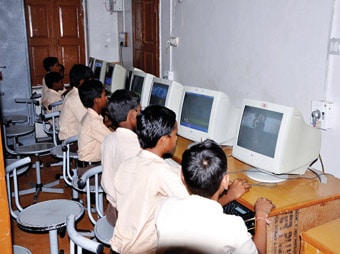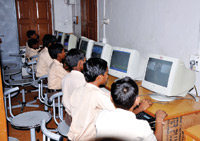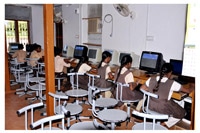
 From systemic professional development practices in context of a teacher, to learner centered educational approaches, Intel’s Education Transformation model is helping prepare India’s next generation for success
From systemic professional development practices in context of a teacher, to learner centered educational approaches, Intel’s Education Transformation model is helping prepare India’s next generation for success
Sixty kilometers from Ahmedabad, in Mehsana district, there is the village called Gozaria. A large grouping of village inhabitants has gathered at Smt MK Patel High School to listen to a speech on heart disease. Health officers of the area are also present. But it’s not a cardiologist who is the speaker. It is students of class 9 and 10. They do a multimedia presentation on heart disease, highlighting how our lifestyle can lead to clogged arteries and heart attacks. There are animated videos on various types of heart surgeries, as well as interviews with heart patients and doctors, that drive home the fact that by changing our diet we have a good chance of countering heart related diseases. The audience leaves the school with an increased awareness about the heart.
How did this happen? How have students from a village become capable of making such an impact in their community? How did their teacher impart such knowledge to them?
 “Digital learning and technology create miracles, not just in the classroom, but outside as well,” says Jitendra Kumar Patel, a science teacher, who is credited with enabling his students to speak convincingly on the abstruse subject of heart diseases. Patel started his career in the traditional ‘chalk and talk’ methodology. He had a transformational experience when he attended the Intel Teach program, back in 2001. “This training changed my outlook towards education and showed me a new way in which technology and digital learning could transform traditional classrooms into 21st century classrooms, and foster higher order thinking, technological skills and various other skills in students,” Patel says.
“Digital learning and technology create miracles, not just in the classroom, but outside as well,” says Jitendra Kumar Patel, a science teacher, who is credited with enabling his students to speak convincingly on the abstruse subject of heart diseases. Patel started his career in the traditional ‘chalk and talk’ methodology. He had a transformational experience when he attended the Intel Teach program, back in 2001. “This training changed my outlook towards education and showed me a new way in which technology and digital learning could transform traditional classrooms into 21st century classrooms, and foster higher order thinking, technological skills and various other skills in students,” Patel says.
That’s exactly what Intel set out to achieve when it started the Intel Teach program in Gujarat. The program has covered 26 districts so far. Over 110,000 teachers from government and private schools, and 112,874 Teacher Educators and Student Teachers from 280 colleges have been trained.
To reach out to various schools in these districts, Intel works with various state-level organizations, such as Gujarat Secondary and Higher Secondary Education Board (GSHSEB), Sarva Shkisha Abhiyan (SSA), Gujarat Council of Education Research and Training (GCERT) and Commissioner of Schools. Intel is collaborating with the Commissioner of Schools to train teachers from over 3,600 schools in the state. Intel also signed the World Ahead State MoU with the Education and Tribal Department to support the state Chief Minister’s 10-point program, as part of Vibrant Gujarat Summit 2009. Intel works with NGOs, and local companies to enable the implementation of its initiatives.
The Gujarat government is serious about enabling education in the state. At a recent Intel Teach training event held at Gandhinagar, CV Som, Commissioner, Schools, urged teachers to make use of the facilities being made available. He said, “All Grant in Aid secondary schools in the state have been given 11 desktop computers, one LCD TV, a scanner and printer under the ICT @ School scheme. Schools need to make most use of it. Intel is providing free training and every teacher should make the best use of this opportunity.”
Ushering in Change
Intel has been committed to education transformation for more than a decade now. The company believes that improvements in education can only happen through a holistic and systemic approach, which takes into account the critical and interrelated components of education transformation.
The model for successful education transformation leveraged by Intel includes policy, curriculum standards and assessment, professional development, information and communications technology (ICT), and research and evaluation. When all of these components are successfully integrated and implemented, real education transformation can take place.
| Transformation Possible Under the guidance of their science teacher, Jitendra Kumar Patel, students of class 9 and 10 went about doing a project on heart disease with an aim to educate their community on the topic. They conducted interviews of doctors and patients. They did Internet research, collected animated videos and pictures. They worked together as a cohesive team to complete the project. The project went on to win Intel – Gujarat Government Technology in Education Award 2010.Patel found a huge change in students as they worked on this project.
Patel has been using technology in classrooms for many years now. Here’s how Intel’s training has enabled him:
And it’s not just Patel, other teachers from across the state have similar stories to tell. A teacher at Jainachary Anandghansuri Vidhyalay, Himmatnagar, Sabarkantha, Mitesh Bhatt, says, “By using technology, we have improved the art of teaching. We have observed students showing positive results as part of the collaborative learning and interaction that happens in class now.” |
“Secondary schools in the state have been given 11 desktop computers, one LCD TV, a scanner and printer under the ICT @ School scheme. Schools need to make most use of it”-C V Som, Commissioner, Schools, Government of Gujarat
Benefits from Education Transformation
Effective education transformation brings a number of benefits. Research has shown that quality education has a direct impact on economic growth.
-
Increasing student competitiveness by developing skills such as digital literacy, problem solving, critical thinking and collaboration.
-
Helping citizens develop lifelong learning skills, and better preparing them for current and future employment.
-
Creating economic development as local businesses benefit from a better-educated citizenry and workforce.
-
Creating more social cohesion and a better social climate as access to technology, the Internet, and digital content narrows the digital divide and creates opportunities.
-
Immediate economic benefits to local businesses that help develop and deliver education solutions.
There’s no doubt that education transformation has a huge impact on the society. Intel believes in creating economic and social opportunities for all. And that’s why Intel works with governments to improve the quality of their education system using a holistic model. Replicating this model all over India is Intel’s mission so that the objectives of the country become inclusive and the goal of universal education is reached.





















